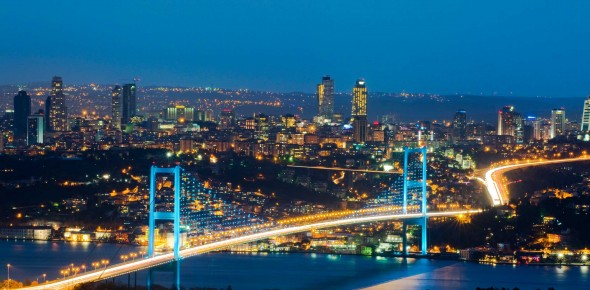Turkey turning into regional energy hub

By Sara Rajabova
Turkey, as a rising power in the global arena has been determined to extend its influence well beyond its region. Considered by some experts as an emerging power, Ankara’s importance is rising day by day in view of developments taking place in the world.
The country which occupies a perfect geographical position in the world map has become an active participant of huge projects, especially in the energy and transportation sector, in an attempt to act a bridge in between Europe and Asia. Turkey is a natural transit corridor between the world’s largest natural gas exporters and importers.
However, Ankara is not satisfied with being just a transit country. The country, which is itself a major natural gas consumer with its annual demand of about 50 billion cubic meters, is trying to ensure its energy security by decreasing its energy costs and diversifying its sources.
In this regard, being an important energy bridge and a partner in numerous energy and transportation projects certainly brings great dividends to Turkey.
Bruce Pannier, an expert on Central Asia and senior correspondent at Radio Free Europe/Radio Liberty told AzerNews that Turkey is in a fantastic position when it comes to buying gas.
“Azerbaijan, Russia, Turkmenistan and Iran all want to ship gas through Turkey to Europe and sell some of that gas to Turkey at the same time. So, Ankara is well placed to dictate the terms and price of sale or it will simply not agree to be part of projects across its territory,” Pannier said.
Iran, Russia and Azerbaijan export about 10 bcm/a, 27 bcm/a and 6.6 bcm/a to Turkey respectively.
Beside its traditional energy partners, Turkey is also eyeing to buy Turkmen gas without Iran’s mediation. Turkmenistan’s gas is reaching Turkey via Iran. Iran, which meets 20 percent of Turkey’s gas needs, buys cheap gas from Turkmenistan and sells it to Turkey at a higher price.
Turkey and Turkmenistan signed a frame agreement in 2013 regarding the export of natural gas from Turkmenistan to Turkey. However, the agreement has remained on paper, due to a lack of direct supply routes.
Currently, Turkmenistan is interested in supplying its gas through the Trans Caspian Pipeline that is expected to transport Turkmenistan and Kazakhstan's natural gas to Azerbaijan via a 300 km-long offshore pipeline under the Caspian Sea.
Moreover, Iraq is willing to supply Turkey with much cheaper gas that Ankara is currently buying from Iran. Turkey purchases 1000 cubic meters of Iranian gas at $490, when prices in Russia and Azerbaijan are much lower -- $425 and $335 respectively, according to media reports.
Turkey also enjoys effective cooperation with its traditional partners, which aim to supply its recourses to Europe. The country is one of the main participants of the Southern Gas Corridor project that envisages the supply of Caspian Sea resources to energy-hungry Europe.
“Turkey and Azerbaijan have been cooperating closely in the natural gas sphere. There is already the Baku-Tbilisi-Erzurum, construction of TANAP has just started and the European Union is working actively to support its Southern Gas Corridor project, which inevitably will mean more gas pipelines across Turkey,” Pannier said.
The expert also noted that Russia is pushing its Turkish Stream project which essentially would come to replace the South Stream plan. “Of course there is also the Blue Stream pipeline from Russia to Turkey.”
The increasing number of huge projects turns Turkey into a natural gas bridge between East and West. The country’s position in the international arena is expected to rise further with the implementation of the above-mentioned projects.
--
Sara Rajabova is AzerNews’ staff journalist, follow her on
Twitter: @SaraRajabova
Follow us on Twitter @AzerNewsAz
Here we are to serve you with news right now. It does not cost much, but worth your attention.
Choose to support open, independent, quality journalism and subscribe on a monthly basis.
By subscribing to our online newspaper, you can have full digital access to all news, analysis, and much more.
You can also follow AzerNEWS on Twitter @AzerNewsAz or Facebook @AzerNewsNewspaper
Thank you!
